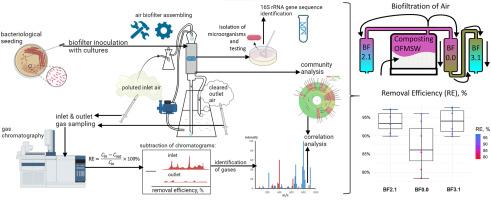在对城市固体废物堆肥产生的气体排放进行生物过滤过程中,去除存在易降解化合物的萜烯。
IF 8
2区 环境科学与生态学
Q1 ENVIRONMENTAL SCIENCES
引用次数: 0
摘要
在对城市固体废物(OFMSW)中的有机部分进行堆肥处理的同时,会排放出大量有害、危险和恶臭的挥发性有机化合物(VOCs)。萜烯是挥发性有机化合物的重要组成部分,为了提高去除萜烯的效率,我们从生物滤池的微生物群落中分离出了在微生物群落中占主导地位的微生物纯培养物。分离出的 7 种纯培养物在以萜烯蒸汽为唯一碳源和能源的矿物培养基上进行了生长测试。其中三个生长最旺盛的培养物被选中,并通过 16S rRNA 基因鉴定为红球菌 CA1、Rhodococcus pyridinivorans CA3 和 Gordonia sp.三个相同的实验室生物过滤器(BF)接种了这些培养物的混合物,以测试更彻底地去除萜烯的可能性。生物过滤器在 45 天内适应清除萜类和香叶醇蒸汽的混合模型。在 45 天内,模型混合物的净化效率平均达到 91.5%,接触时间 (CT) 为 3.7 ± 0.2 秒,萜烯蒸汽浓度为 14 ± 2 mg m-3。然后将编号为 BF2.1 和 BF3.1 的生物过滤器与 OFMSW 堆肥的实际排放物相连接。生物滤池 BF2.1 直接净化了排放物,而 BF3.1 则净化了经过第一阶段净化的中间生物滤池(BF0.0)后的类似排放物。作为对照,BF1.0 与模型组合的净化保持连接。通过在生物过滤器的入口和出口处取样进行气相色谱分析,对生物过滤难以去除的萜烯的效果进行了评估。BF2.1 去除实际排放物中萜烯的平均效率为 93.1%(CT = 5.5 秒)。(BF0.0 + BF3.1) 复合物去除萜烯的总效率为 93.2 %(总 CT = 7.4 秒)。通过稀释液培养、16S rRNA 基因鉴定和指纹图谱分析,对接种生物过滤器 60 天和 90 天后的微生物群进行了研究,结果表明,在 BF2.1 和 BF3.1 中,红球菌 CA1 和红球菌 Pyridinivorans CA3 的活细胞保留率为 6.5-12.4%,基因上与原始培养物完全一致。这些结果对改善生物过滤法对 OFMSW 堆肥排放物的除臭效果、简化生物过滤设施的设计(用一个阶段代替两个阶段)和减少有效生物过滤的总时间具有积极影响。这反过来将有助于在 OFMSW 堆肥设施中更广泛地采用高效的排放净化方法,以便在其周围创造更加舒适和生态清洁的环境条件。本文章由计算机程序翻译,如有差异,请以英文原文为准。

Removal of terpenes in the presence of easily degradable compounds during biofiltration of gas emissions from composting of municipal solid waste
Composting of the organic fraction of municipal solid waste (OFMSW) is accompanied by the emission of large volumes of harmful, hazardous and foul-smelling volatile organic compounds (VOCs). To improve the efficiency of terpenes removal, which constitute a significant part of VOCs, pure cultures of microorganisms dominating in its microbiota were isolated from the microbial community of the biofilter, which has been cleaning such emissions for a long time. Seven pure cultures were isolated and then tested for being able to grow on a mineral medium in the presence of terpene vapor as the only source of carbon and energy. Three of the most actively growing cultures were selected, characterized and identified by the 16S rRNA gene as Rhodococcus erythropolis CA1, Rhodococcus pyridinivorans CA3 and Gordonia sp. CA6. Three identical laboratory biofilters (BF) were inoculated with a mix of these cultures to test the possibility of more complete removal of terpenes. Biofilters were adapting to clearing the model mix of terpineols and geraniol vapors for 45 days. During 45 days the purification efficiency of the model mix reached an average of 91.5% with a contact time (CT) of 3.7 ± 0.2 s and the terpene vapors concentration of 14 ± 2 mg m−3. Then the biofilters number BF2.1 and BF3.1 were connected to real emission from composting OFMSW. The biofilter BF2.1 purified the emission directly, whereas BF3.1 purified similar discharge after the intermediate biofilter of the 1st stage of purification (BF0.0). The BF1.0 was left connected to purification of the model mix as a control. The effectiveness of biofiltration of hard-to-remove terpenes was evaluated by gas chromatography of samples taken at the inlet and outlet of biofilters. The average efficiency of removing terpenes from real emissions by BF2.1 was 93.1 % (CT = 5.5 s). The total efficiency of removing terpenes by (BF0.0 + BF3.1) complex was 93.2 % (total CT = 7.4 s). A study of the microbiota of inoculated biofilters after 60 and 90 days of purification the real emission by cultivation from dilutions, identification by the 16S rRNA gene and fingerprinting showed that in BF2.1 and BF3.1 Rhodococcus erythropolis CA1 and Rhodococcus pyridinivorans CA3 were preserved among living cells at a level of 6.5–12.4 %, and genetically fully corresponded to the original cultures. These results could have a positive impact on improving the results of deodorization of emissions from OFMSW composting by biofiltration, simplifying the design of the biofiltration facility (one stage instead of two) and reducing the total time for effective biofiltration. This, in turn, would contribute to the wider introduction of highly efficient emission purification methods at OFMSW composting facilities in order to create more comfortable and ecologically clean environmental conditions around them.
求助全文
通过发布文献求助,成功后即可免费获取论文全文。
去求助
来源期刊

Journal of Environmental Management
环境科学-环境科学
CiteScore
13.70
自引率
5.70%
发文量
2477
审稿时长
84 days
期刊介绍:
The Journal of Environmental Management is a journal for the publication of peer reviewed, original research for all aspects of management and the managed use of the environment, both natural and man-made.Critical review articles are also welcome; submission of these is strongly encouraged.
 求助内容:
求助内容: 应助结果提醒方式:
应助结果提醒方式:


